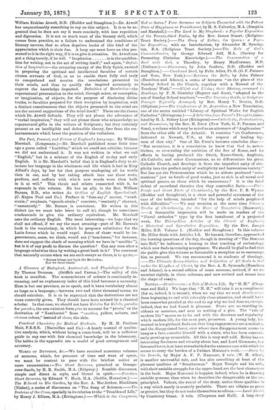The Past, Present, and Future of England's Language. By William
Marshall. (Longmans.)----Mr. Marshall published some little time ago a poem called "Lochlere," which we could not criticise, because we did not understand it. It was not written in what we call "English," but in a mixture of the English of to-day and early English. It is Mr. Marshall's belief that it is England's duty to re- instate her language in the wholeness and life which it had in King Alfred's days, by her for that purpose readopting all its words then in use, and by her taking afresh into use those roots, prefixes, and suffixes with which new words were then built in it at will." This thesis and others connected with it, he expounds in this volume. He has an ally, in the Rev. William Barnes, B.D., who writes An Outline of English Speech. Craft. (C. Kegan Paul and Co.) Preface is " fore-say ;" accent, "word- strain ;" emphasis, "speech-strain ;" concrete, " matterly ;" abstract, unmatterly." Mr. Barnes is consistent. He writes in this dialect (as we must take leave to call it), though he sometimes condescends to give the ordinary equivalent. Mr. Marshall uses the ordinary English. The most interesting—we hope that we shall not offend, if we say the most amusing—part of Mr. Barnes's book is the vocabulary, in which he proposes substitutes for the Latin forms which he would expel. Some of these would be im- provements, some, we think, would not (" henchman," for instance, does not suggest the shade of meaning which we have in" satellite "), but is it of any profit to discuss the question? Can any man alter a language otherwise than by writing a great book in it ? The comment that naturally occurs when we see such essays as these, is to quote,— . Nature brings not back the Mastodon, Nor we those times."


































 Previous page
Previous page